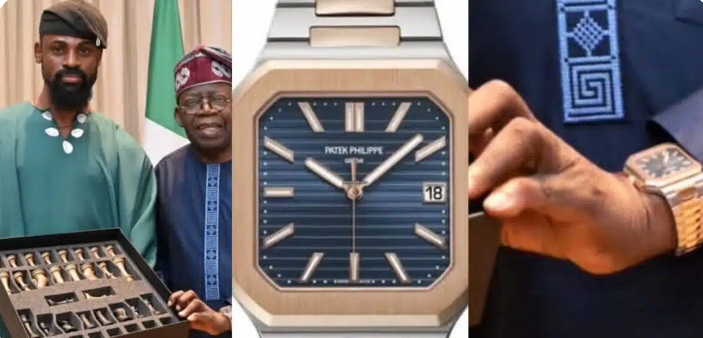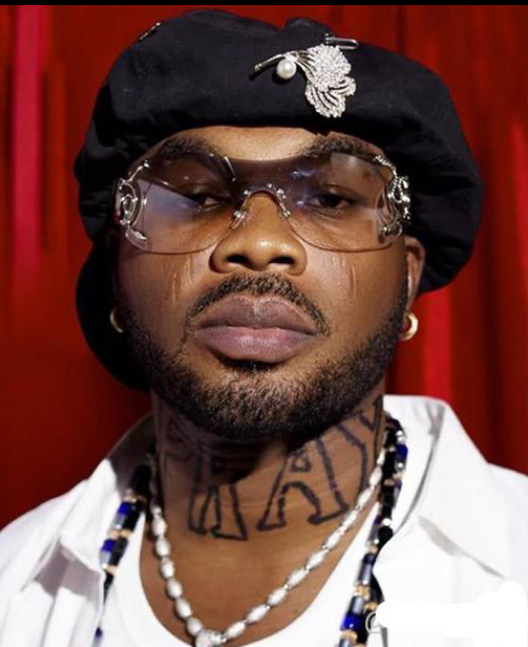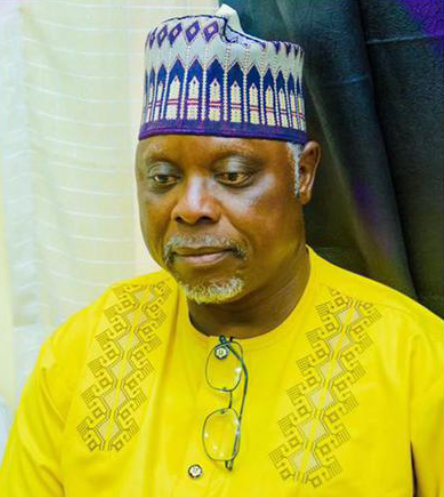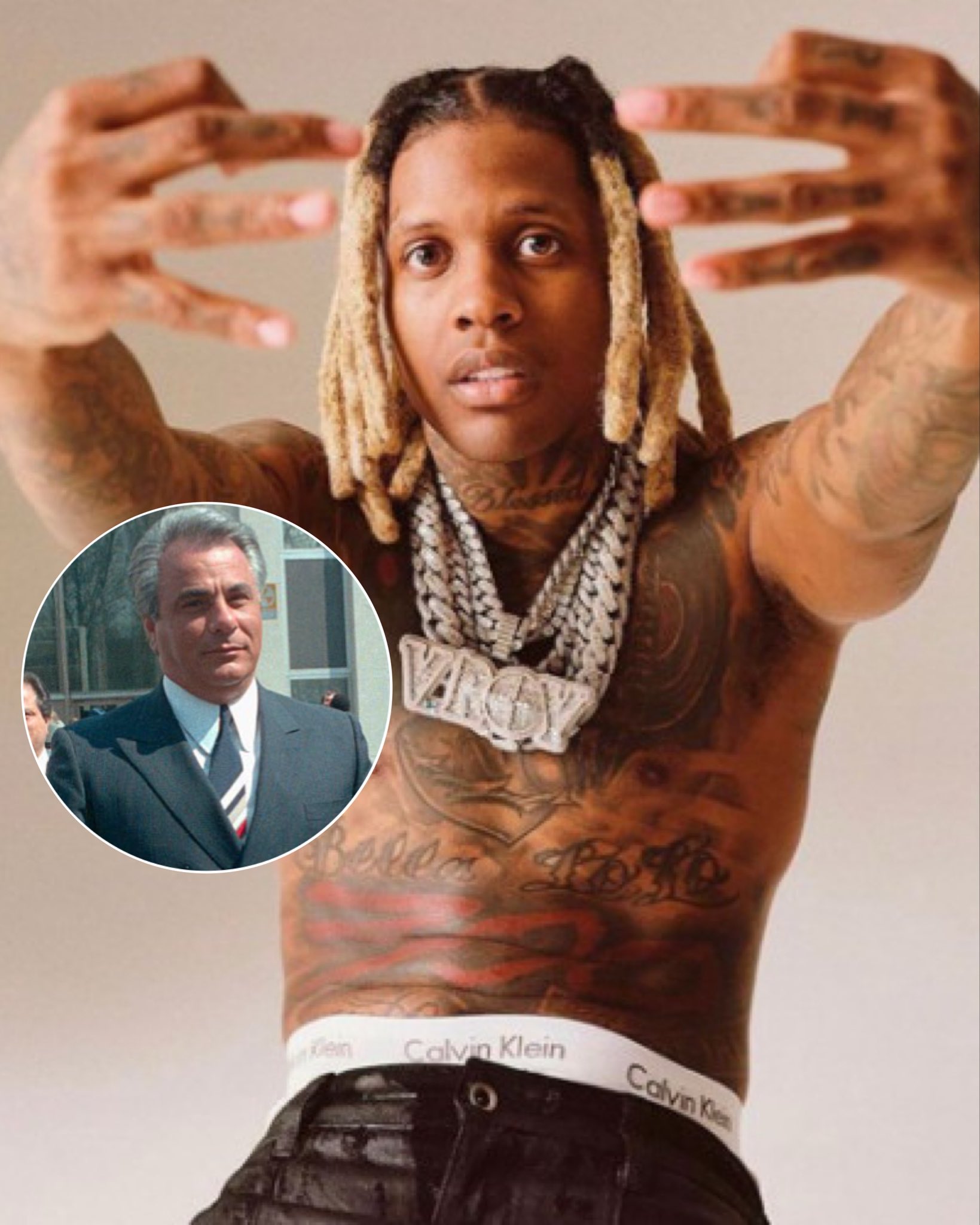
₦94 Million on the Wrist: Tinubu’s Patek Watch Ignites Firestorm Amid National Hardship

The polished glint of a luxury wristwatch has become the latest flashpoint in Nigeria’s tense socio-economic discourse, as President Bola Ahmed Tinubu finds himself at the center of a brewing controversy. During a recent public appearance with chess grandmaster and Guinness World Record holder Tunde Onakoya, the President was photographed wearing what eagle-eyed observers swiftly identified as a Patek Philippe wristwatch—an elite timepiece whose reported price has ignited outrage across the country. Valued at approximately $61,280, which translates to around ₦94,170,316.80 using the current official exchange rate, the wristwatch has transformed from an accessory into a symbol of inequality, wastefulness, and tone-deaf governance, at least in the eyes of a frustrated citizenry.
The picture, which initially seemed to portray a routine engagement between the nation’s leader and a celebrated young talent, quickly escalated into a social media wildfire once the cost of Tinubu’s wristwatch surfaced online. It wasn’t the admiration for Patek Philippe’s impeccable Swiss craftsmanship that trended—it was the staggering cost, juxtaposed against the crushing financial burdens most Nigerians currently endure. With inflation choking households, fuel prices at record highs, and unemployment remaining stubbornly persistent, many were unable to digest the optics of their President casually flaunting what amounts to years of their hard-earned wages on his wrist.
“This is not just about a watch. It’s a mirror reflecting everything wrong with leadership in Nigeria,” tweeted one user in response to the viral images. “People can’t even afford a bag of rice, yet he’s strapping nearly a hundred million naira on his wrist like it’s a slap in the face.” The sentiment was echoed by another online commentator, Aghedo, who dryly remarked, “President of the Federal Republic of Nigeria. Money when dey this country too long,” capturing a wave of public cynicism.
To many, this episode isn’t merely about luxury fashion or personal taste. It’s emblematic of a broader discontent that has long simmered under the surface—a sense that Nigeria’s political elite live in a different world entirely, untouched by the policies they impose or the suffering that persists under their watch. From the fuel subsidy removal that drastically increased living costs to the continuing naira devaluation, Tinubu’s administration has asked Nigerians to tighten their belts, sacrifice, and endure. But the visual of that Patek wristwatch has, for some, irreparably damaged the credibility of that narrative.
“This one wey look like #750 aboki watch?” scoffed Bamigbelu Olu, one of many Nigerians unimpressed not only by the cost but also the appearance of the watch. His comment added an ironic layer to the scandal—if the watch doesn’t even appear visibly extravagant to the untrained eye, why the need to wear it at all, especially at such a moment in the country’s economic story?
Supporters of the President have tried to deflect the criticism, arguing that leaders around the world wear luxury items and that personal property shouldn’t be conflated with public corruption. Some even suggested that the watch may have been a gift or an old possession predating Tinubu’s time in office. But in the court of public opinion, those arguments are struggling to gain traction. The average Nigerian isn’t drawing a line between personal wealth and public service anymore—not when public service seems to come with such glaring displays of personal opulence.
In the streets of Lagos and the scrolls of X (formerly Twitter), the conversation has turned from the watch itself to a much more profound concern: leadership sensitivity and accountability. “We don’t care if it’s his own money. The point is, when a nation is suffering, its leader shouldn’t be out there flaunting extreme luxury. Period,” posted a user named Clear Waters, summing up the core of the public outrage.
The Patek Philippe controversy has reignited debates on how politicians should present themselves during times of national distress. Nigerians have become increasingly vocal about their expectations from public office holders—not just in policy-making but in how they model the sacrifice they often demand of citizens. This isn’t the first time a luxury accessory has triggered backlash, but the context surrounding this instance—the presence of Onakoya, a youth symbolizing endurance and achievement, and the timing during a tough economic downturn—makes it particularly explosive.
It is also worth noting that Tinubu’s administration has been attempting to woo international investors, boost national morale, and encourage citizens to adopt a more resilient spirit amid reforms. Against that backdrop, critics argue, a show of restraint and humility could go a long way. “Tinubu nor small before now. Money na water,” Olasunkanmi wrote, highlighting the long-standing perception of the President as a man of immense wealth. But even such a reputation, valid or not, is being reevaluated under the lens of his current public responsibilities.
The digital backlash isn’t merely restricted to civilians. Policy analysts and civil society groups are beginning to weigh in, arguing that public figures should be conscious of symbolism. When a watch costs more than the lifetime earnings of many Nigerians, it becomes not just a fashion statement, but a political one.
This situation arrives at a time when citizens have become more assertive in demanding transparency, accountability, and empathy from their leaders. While Tinubu has yet to issue any public statement about the watch, many believe that silence may only deepen the perception of aloofness. In a hyper-connected age, where every image is scrutinized and every luxury dissected, nothing a leader wears, eats, or owns is apolitical.
Whether the outrage dies down in a matter of days or morphs into a recurring symbol of disconnection between the government and the governed, one thing is clear: the image of President Tinubu shaking hands with Tunde Onakoya with that shimmering timepiece on his wrist is now indelibly etched into the nation’s consciousness. And in a country where time seems to run slower for the poor and faster for the privileged, it’s hard to ignore the cruel poetry of it all—when even time, it seems, wears a price tag that most Nigerians can never afford.


